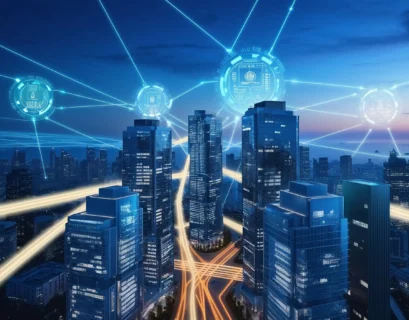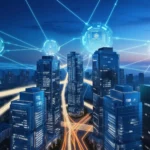In today’s rapidly evolving digital landscape, technology plays a central role in shaping our daily lives, the economy, and societal interactions. As we stand on the cusp of what many are calling a Fourth Industrial Revolution, the convergence of emerging technologies is spurring unprecedented advancements. This article delves into industry insights, technical innovations, and future outlooks that define the tech realm as we know it.
Section 1: Current Industry Insights
The State of Technology in 2023
As of 2023, the technology sector is thriving, driven by several key trends. With the advent of artificial intelligence (AI), machine learning (ML), the Internet of Things (IoT), and blockchain, industries ranging from healthcare to finance are undergoing metamorphoses that were largely unimaginable just a decade ago.
1.1 AI and Machine Learning
AI and ML have cemented their positions as the backbone of modern innovation. Industries are leveraging these technologies for predictive analytics, customer service automation, and personalized experiences. For instance, in healthcare, AI algorithms can predict patient outcomes and recommend treatments based on individual profiles, thereby improving efficiency and patient care.
1.2 The Internet of Things (IoT)
The IoT ecosystem continues to expand, with billions of devices connected globally. Smart homes, wearables, and industrial IoT applications are improving efficiency and enhancing user experiences. The integration of IoT with AI is particularly noteworthy – devices are not just "smart" due to their connectivity but are also learning and adapting based on user interactions.
1.3 Blockchain Technology
Blockchain is no longer constrained to cryptocurrency. Its potential for secure and transparent transactions is being harnessed in supply chain management, identity verification, and smart contracts. As regulatory frameworks mature, blockchain adoption is expected to accelerate, offering a reliable alternative to traditional systems.
1.4 Sustainability and Green Tech
Environmental concerns are driving innovation towards more sustainable technologies. Companies are increasingly focusing on energy-efficient solutions and sustainable practices. From electric vehicles (EVs) to renewable energy solutions, green technology is not just a trend but a necessity in combating climate change.
Section 2: Technical Innovations
2.1 Quantum Computing
Quantum computing remains at the frontier of technological advancement. While it is still in its infancy, its promise of solving problems beyond the capacities of classical computers is attracting significant investment and research. Organizations like Google, IBM, and various startups are working on making quantum computers more accessible, opening the doors to breakthroughs in drug discovery, material science, and cryptography.
2.2 Augmented Reality (AR) and Virtual Reality (VR)
The realms of AR and VR have transcended their early entertainment applications, penetrating fields like education, training, and real estate. Companies are harnessing these immersive technologies to create realistic simulations for training purposes, allowing professionals to practice their skills in a risk-free environment. The gaming industry, of course, continues to be a major driver, with advancements in hardware and software providing increasingly immersive experiences.
2.3 5G Technology
The rollout of 5G networks is revolutionizing the mobile landscape. With significantly faster data speeds and reduced latency, 5G technology paves the way for a new generation of applications in areas such as autonomous vehicles, smart cities, and enhanced mobile gaming. Its potential to support massive IoT deployments means that entire industries could undergo transformations as connectivity becomes ubiquitous.
2.4 Edge Computing
As the amount of data generated by connected devices surges, so does the need for processing that data efficiently. Edge computing addresses latency issues by processing data closer to its source rather than relying solely on centralized data centers. This innovation is particularly beneficial in applications where real-time data processing is critical, such as in autonomous cars and real-time analytics in manufacturing.
Section 3: Future Outlook
3.1 The Role of Artificial General Intelligence (AGI)
A central query in the future of technology is the trajectory of artificial general intelligence (AGI). While current AI systems excel in narrow tasks, AGI represents a leap towards machines that can perform any intellectual task a human can do. The timeline for AGI remains speculative, but its implications are vast—from transforming the job landscape to raising ethical considerations surrounding machine autonomy and decision-making.
3.2 Implications of Quantum Supremacy
Once quantum computing achieves "quantum supremacy"—the point where quantum computers outperform traditional counterparts in specific tasks—the implications will be profound. In the short term, this could disrupt industries reliant on computational tasks, including optimization problems and simulations. In the long run, advancements in quantum algorithms could revolutionize sectors like finance and pharmaceuticals.
3.3 The Evolution of Work
The pandemic-induced shift to remote and hybrid work has established a new paradigm that likely persists. Technologies for collaboration and communication, AI-driven productivity tools, and virtual environments for team interactions will continue to evolve, leading to more flexible work arrangements. The focus will be on maintaining productivity while prioritizing employee well-being, reigniting conversations about work-life balance.
3.4 Data Privacy and Cybersecurity Challenges
As reliance on technology deepens, so too do concerns regarding data privacy and cybersecurity. Recent high-profile breaches have raised awareness of the need for robust security measures. As regulations like GDPR become the norm, organizations must prioritize data protection, ethical AI usage, and transparency to maintain trust.
Section 4: Industry Case Studies and Applications
4.1 Healthcare Transformation
One of the most striking applications of technology is in healthcare. Telehealth services surged during the pandemic, showcasing how technology can bridge gaps in patient care. Wearable devices enable real-time health monitoring, empowering patients while providing healthcare providers with vital data for preventive care.
4.2 Innovations in Finance
Fintech is revolutionizing finance with solutions that enhance user experience and accessibility. Digital wallets, robo-advisors, and blockchain for secure transactions are examples of how technology is reshaping traditional banking and investing paradigms.
4.3 Smart Cities: A Vision of the Future
Smart city initiatives leverage IoT and big data to improve urban living. From traffic management to energy consumption and waste management, these technologies aim to enhance the quality of life while promoting sustainability. The integration of AI-driven analytics in urban planning can result in more responsive and efficient city infrastructure.
Section 5: Conclusion
The technological landscape is dynamic, with continuous innovations and shifts defining its trajectory. As we embrace advancements in AI, IoT, quantum computing, and sustainability, we also face challenges that necessitate ethical considerations, data security, and workforce evolution.
The future of technology is not merely about technological progression but rather a reflection of the choices we make today. Stakeholders—including businesses, policymakers, and individuals—must collaborate to ensure that technology serves humanity, promotes equitable growth, and protects the environment. As we navigate this complex terrain, it’s essential to remain vigilant, creative, and humanitarian in our pursuit of a future molded by technology.
In conclusion, the next decade promises to be a period of monumental change. As new technologies emerge and existing ones mature, staying informed and adaptable will be crucial for thriving in this era of unprecedented innovation. Empowered by technology, we stand on the brink of exciting possibilities that will redefine our world for generations to come.


















